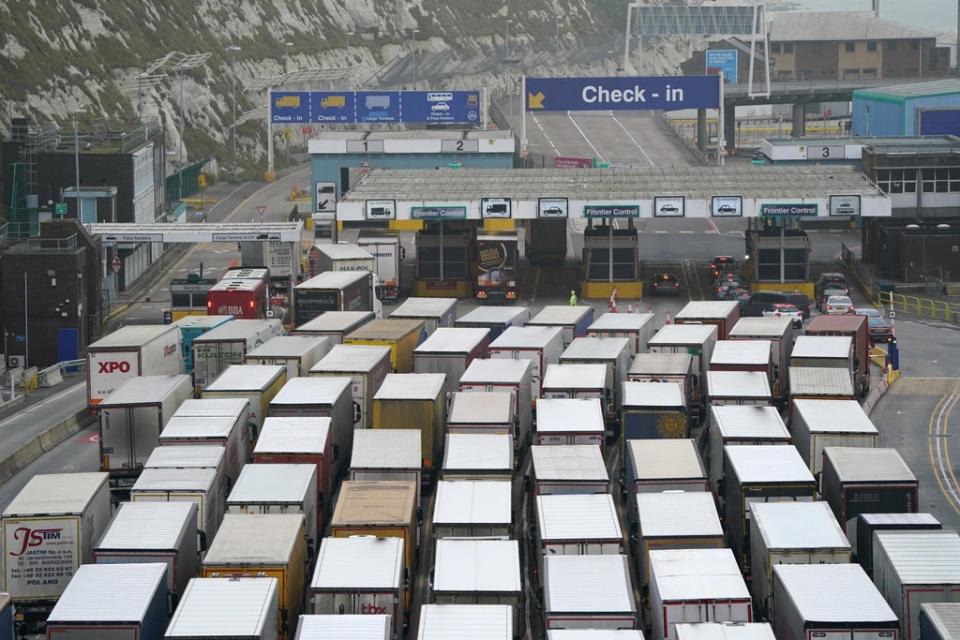Brexit: UK food imports face disruption because ‘medieval’ government IT system not ready for red tape

Food supplies face further disruption from 1 January due to a "medieval" government IT system that is still not yet ready to process post-Brexit paperwork, The Independent has learned.
Companies importing food from the EU must comply with reams of additional red tape from Saturday but, with just hours to go, it was still not possible for some traders to submit vital details of their cargo because government software is plagued by technical bugs.
Problems primarily affect shipments of fruit, vegetables and plants, with importers also experiencing difficulty logging details of animal products.
The government said it was aware of the issue, but had not yet established a workaround, meaning that importers cannot be sure that they are able to submit the required forms for food imports.
It comes at the worst time for the UK, which imports half of all of its food during the winter months, mostly from the EU. The country is particularly dependent on EU imports of fresh fruit and vegetables, with around 90 per cent of lettuces and 85 per cent of tomatoes shipped in from across the Channel.
Food importers are also frustrated that, from 1 January, they will be forced to manually input data for each shipment because software to automatically upload information won't be ready for months.
"It is like we have gone back to medieval times and we are copying books by hand instead of using a printing press," said Michael Szydlo, founder of Quick Declare, a company that helps dozens of businesses import and export goods.
Business groups have warned that the latest wave of Brexit-related paperwork will cause more disruption at the UK border, resulting in less choice and higher prices for British shoppers, as well as more gaps on retailers' shelves.
That would heap further misery on UK households already facing a cost-of-living crisis due to soaring bills, stagnant wages and tax hikes.
From 1 January 2022, importers must comply with a host of new requirements including full customs declarations, rules of origin forms and notifications for food imports.
Shipments of plant and animal products will require online forms detailing every type of item as well as its source and destination.
However, some traders have not been able to submit details into the system, called IPAFFS due to a glitch. IPAFFS sends error messages stating that declarations cannot be submitted without food safety certificates or details of the border control posts where goods will be physically checked.
Importers will not have these details because food safety certificates and physical checks are not required until July and several border control posts have not been built yet.
The government said it was only aware of a “small number” of traders being affected and that the impact would be limited because many importers of plant products can continue to use an older system called PEACH before transitioning to IPAFFS.
“We are investigating these cases and working with impacted users to provide a short-term work around, and apologise for any inconvenience this may cause,” said a spokesperson for the Department for Environment and Rural Affairs (Defra).
Michael Szydlo, who works with dozens of businesses on customs paperwork and procedures, said he believed it was impossible for Defra to prepare the new system before 1 January and that it was likely that many small firms would only discover problems when they attempt to ship goods in the new year.
“The whole system is makeshift and out of date. Nobody from government has so far confirmed that it will work when it goes live. How can companies prepare based on assumptions?” he said.
Even if the government does belatedly issue a workaround, businesses will still face a big jump in the amount of administration on food imports. Every detail, such as the genus of the plant, the variety and weight, must be typed into government systems manually rather than uploaded through a spreadsheet.
Software to allow automatic uploads was supposed to be ready by 1 January, but has been delayed, with no firm date set for its release. Importers say this hugely multiplies the time spent on bureaucracy, meaning that a small load with a dozen different types of products and several delivery addresses could create hours of paperwork.
The problems are expected to primarily affect smaller businesses which do not have the expertise or resources to cope.
Just one in four small and medium-sized businesses are ready for the 1 January changes, according to a poll by the Federation of Small Businesses (FSB).
“It is absolutely vital that all government systems – including IPAFFS – are working at 100 per cent efficiency in order to avoid supply chain disruption,” said James Sibley, head of international affairs at the group.
The Food and Drink Federation forecasts that imports to the UK will fall sharply in January while businesses assess the situation, as they did in 2021. Problems will be exacerbated by global supply chain disruption that has “severely limited capacity to stockpile” goods, the FDF said.
The federation warned in a recent briefing note it was “inevitable” businesses will experience issues at the border and that “in some cases, this could result in significant barriers to trade that risk blocking deliveries from EU suppliers altogether, at least temporarily.
“For just-in-time supply chains, this presents a real risk which could disrupt the operation of UK supply chains where a critically important ingredient is delayed or fails to arrive. Such delays could also lead to other ingredients already at factories being unusable.”

 Yahoo Finance
Yahoo Finance 